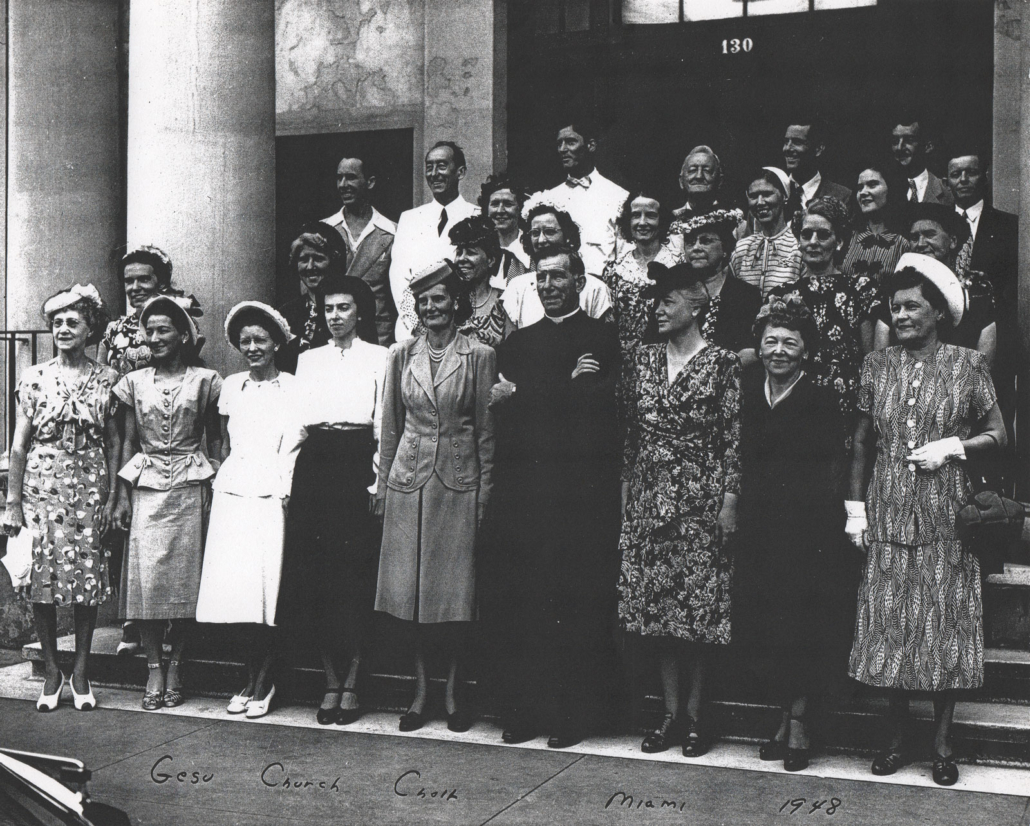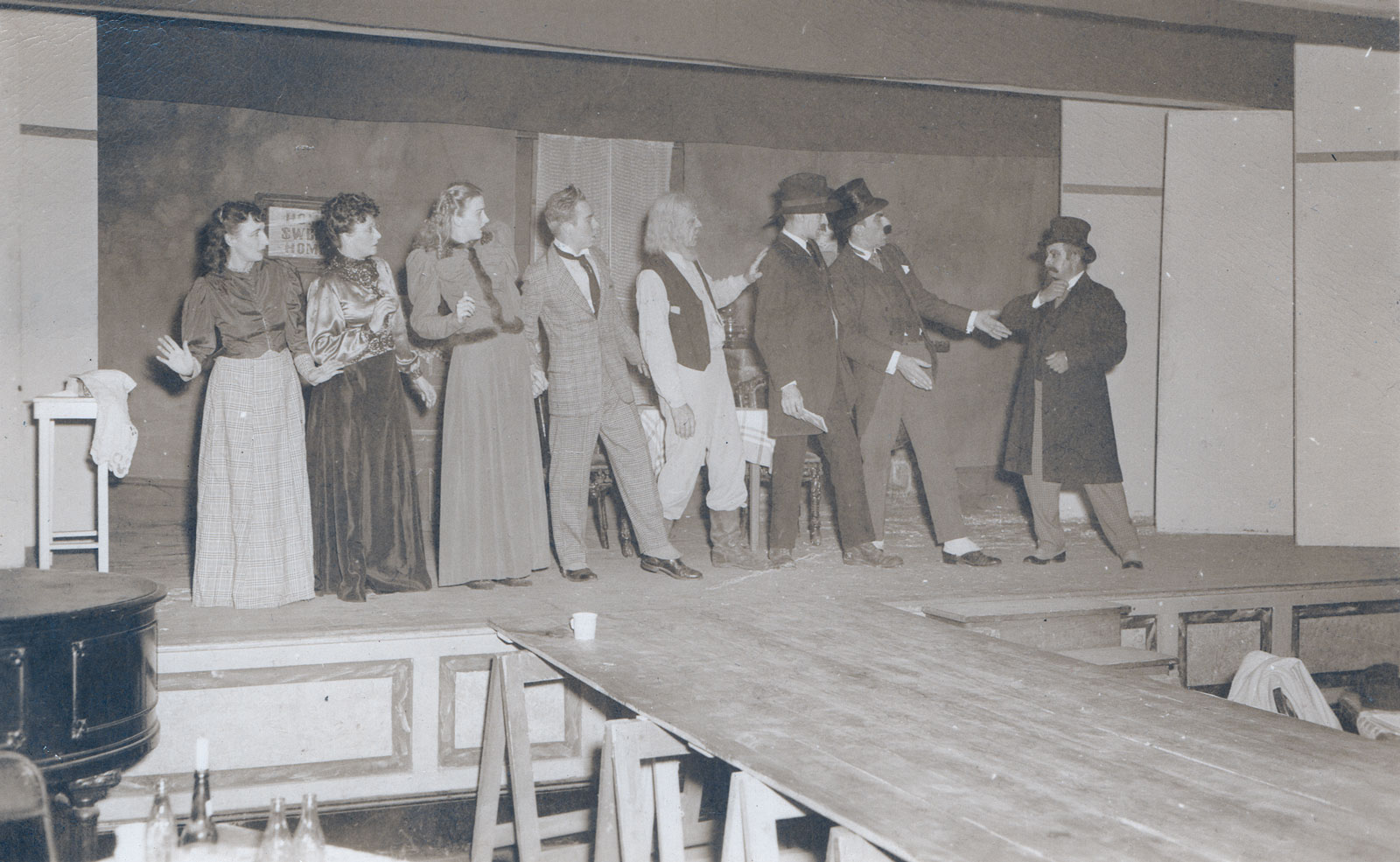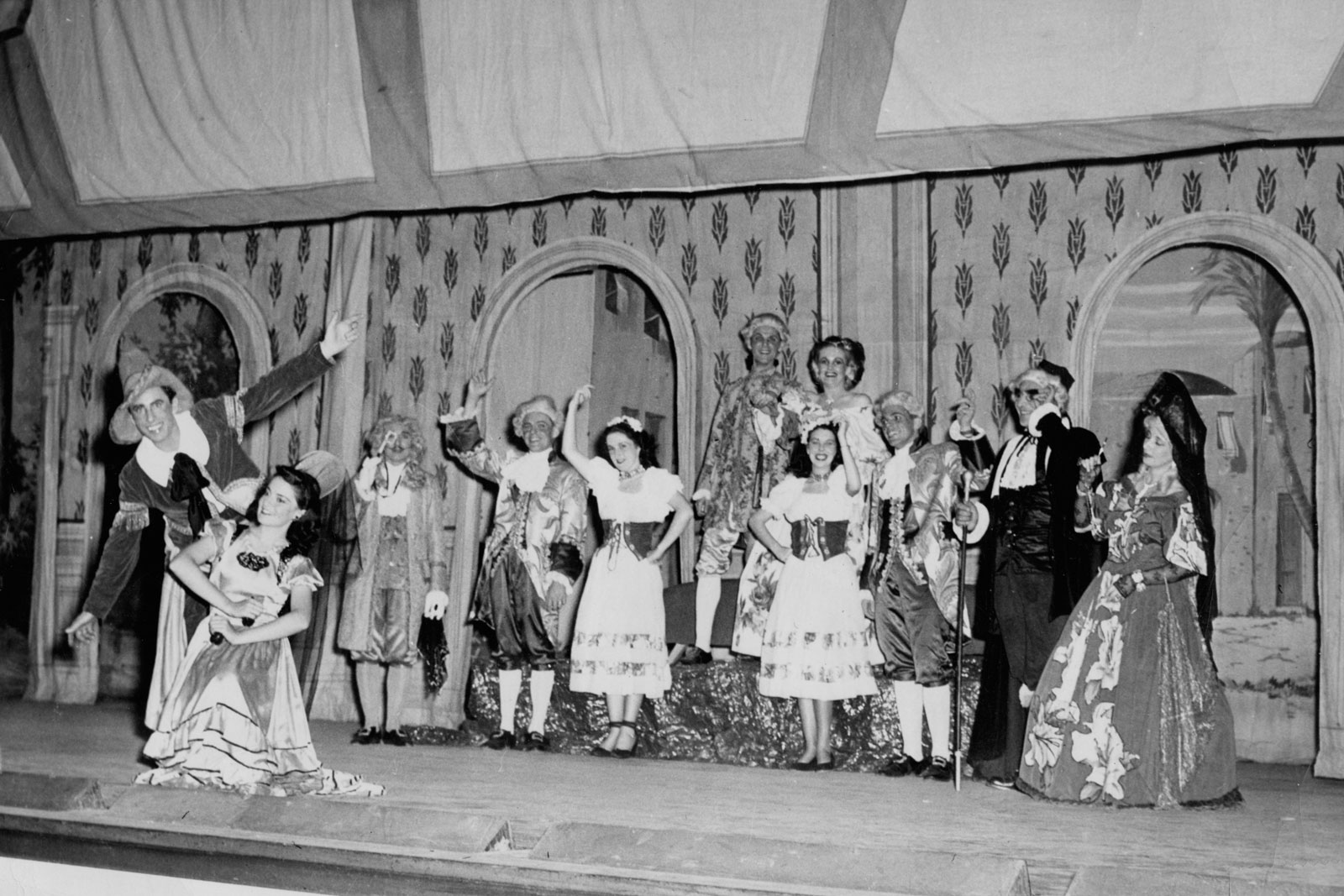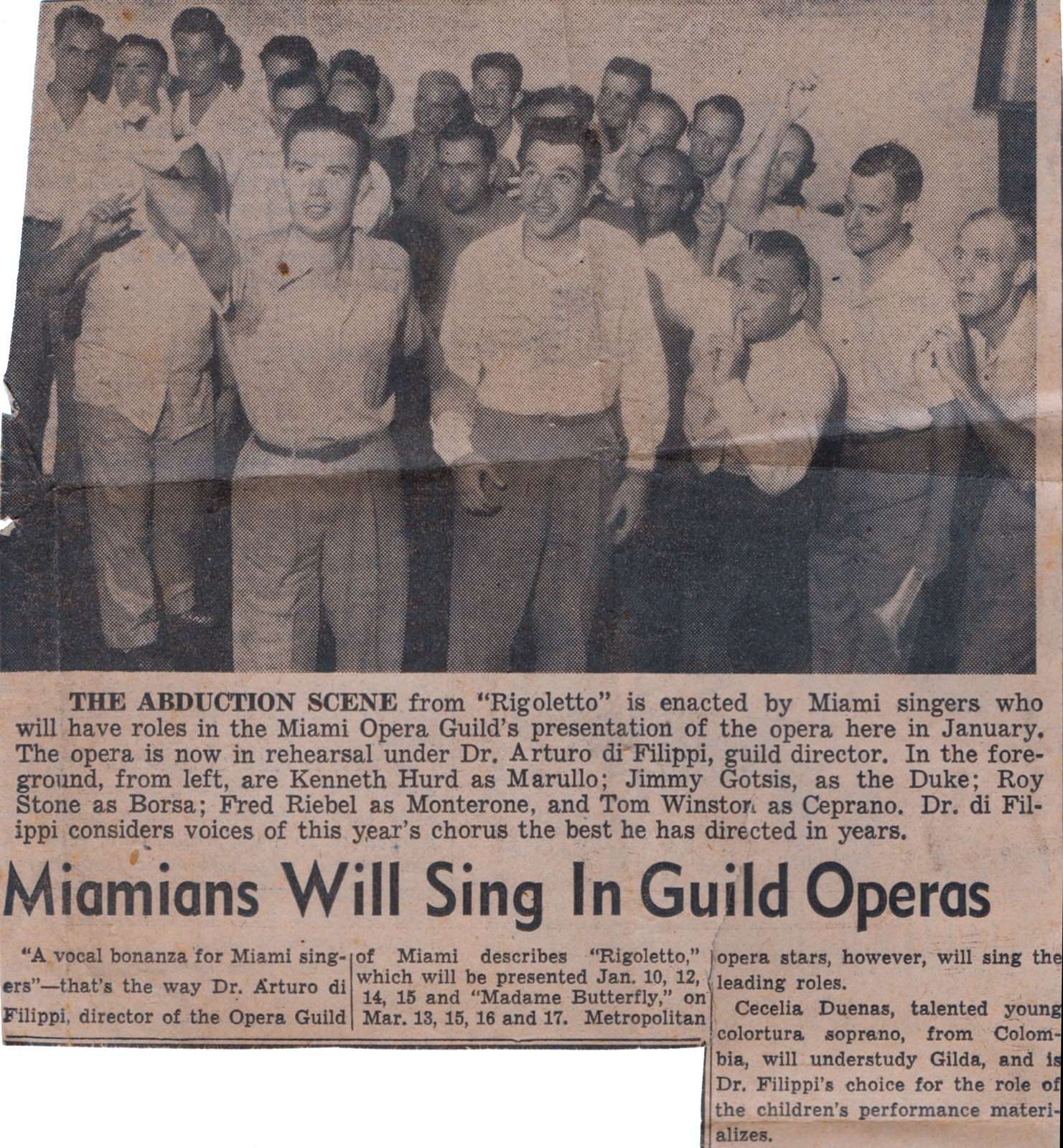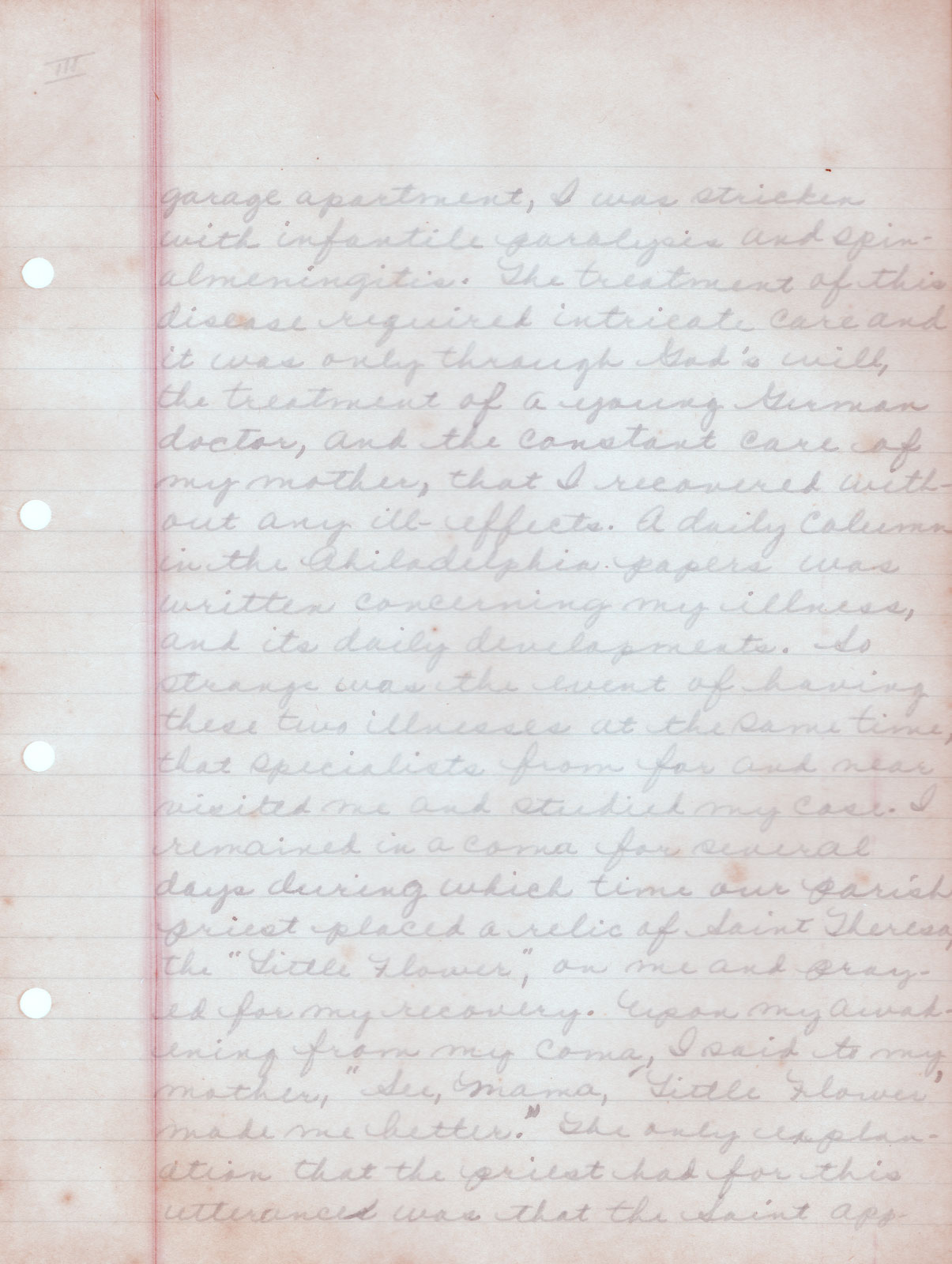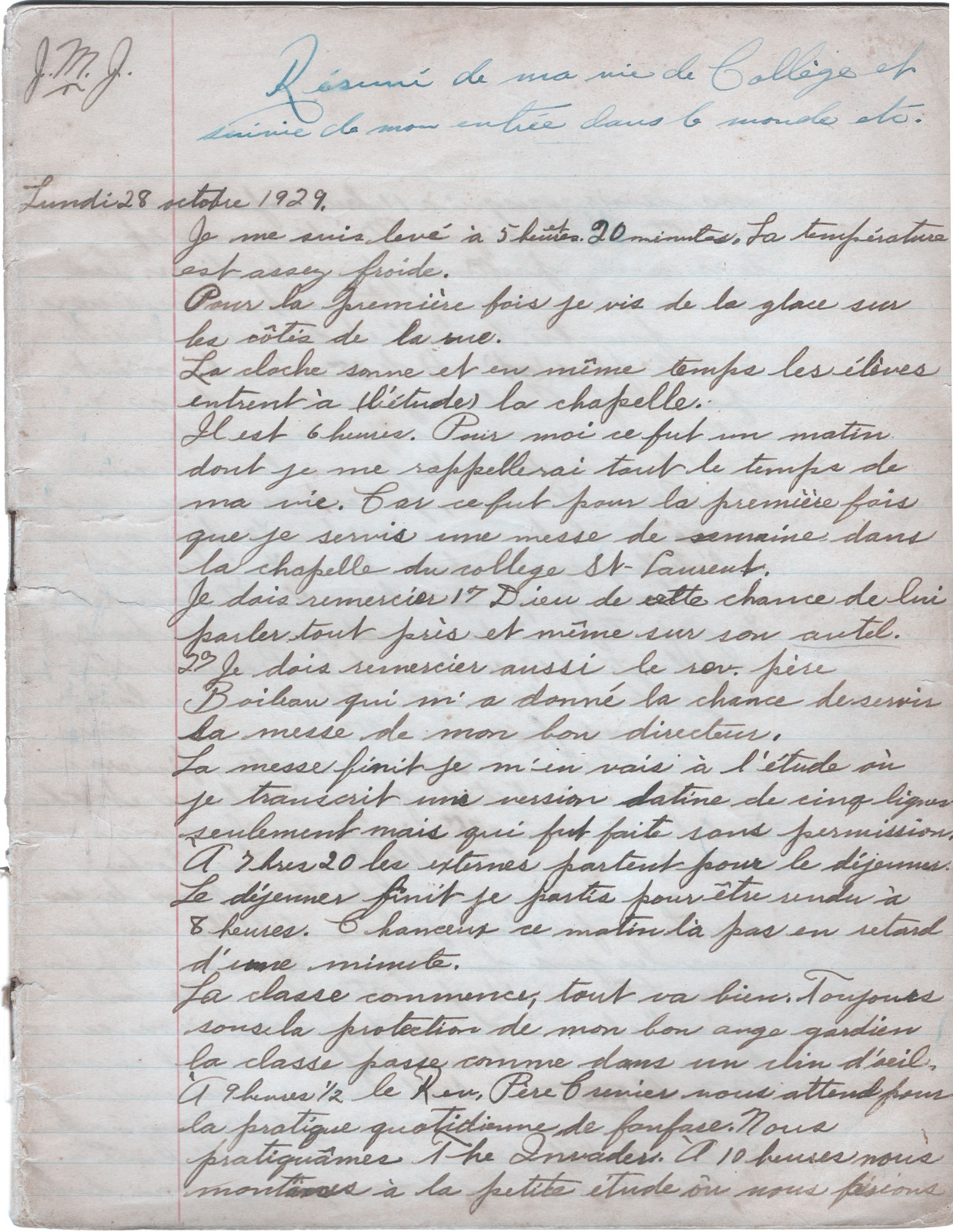Music among Friends
16 March 2017
Church and musical theater programs drew both Marian Frances and Paul Emile like moths to flames.
They met at downtown Miami’s Gesu Church where they sang in the church choir as well as in Gilbert & Sullivan operettas led by a talented theater director and producer who would later be ordained as Father Val LaFrance and become a nationally-known lecturer as well.
Before I read our father’s journal and got a much better idea of his college studies and experience, I couldn’t even picture his fitting-in at all in post-war Miami. But in many ways I now realize that the ambitious musical enterprises centered around Gesu Church and the Miami Opera Guild must have seemed like “coming home” to him. I fear my memories of our father mostly revolve around later financial hard times, and it is only now that I look at photos of our parents’ young adult years and realize how much fun they were having. Not long ago one of my nieces, Emily, expressed how much fun something was—and then she repeated it on another occasion: “It was fun!” When I re-read our mother’s memoir, and our father’s journal, it struck me that they said exactly the same thing, over and over again—every time there was a gathering of people and there was music. It cheers me no end to know they enjoyed good times to the fullest.
Their Roman Catholic beliefs were a major source of common ground for them both. Although there was a difference of nearly fourteen years in their ages, there are several parallel experiences in our parents’ lives. One of them is that they did both write detailed journals of their lives in their late teens and, in our father’s case, until he turned 24 years old. In those, they ponder very seriously how they can make something of themselves in their future. From her account, our mother’s pursuit of a music career in radio can be seen as a careful, earnest, step-by-step process. In contrast, our father’s approach was a full-on improvisation: He turned into an impresario in any family group or community he happened to land amongst—playing any one or more of a half dozen instruments and organizing impromptu concerts and plays. Although in Miami he was likely a bit shy at first because his English was not very good in the mid 1940s, I’d guess he readily jumped into the music with both feet. When—at age 36—he found the Gesu Church Drama Guild community and Marian Dawson he must have realized pretty quickly his good fortune.
Each on their own, and together, they quickly established a large network of friends in the Miami community—some of them in connection with their day jobs, but most of them related to music.
As the years went on, they eventually formed a tight-knit group of people from several church choirs, opera troupes, and drama projects whose friendships endured their entire lives—even when live musical presentations on the scale they had grown up with were no longer the fashion. Their friends in Miami—and friends and family in French Canada—offered invaluable support at many critical junctures. As Paul Emile became director of music for additional schools and churches in the Miami metropolitan area, our family became the friends of other large families involved in the numerous musical productions and choirs he taught and directed.
Like Marian, Paul Emile was a card-carrying union musician in the American Federation of Labor’s American Guild of Variety Artists. He also belonged to the Knights of Columbus, the Glee Club WPB, and the Gesu Drama Guild. But, for the most part, his gainful employment was with garages in the Miami area, doing what he had done with his company in Montreal, as well as just about any other self employment or contract work opportunity he could find.
Sometimes I wonder whether he may have left Montreal at least partly because he realized that his many years of training to be a professional music director—and then the dearth of available positions he encountered in the 1930s decade of the Depression when he graduated—meant he was never going to attain his goal in Canada. From 1937 through 1940 he had devoted nearly all of his energies to making a success of turning his father’s and his uncle’s business establishments into an automobile rental and repair shop—until the economy recovered and younger family members could better sustain themselves. Now in his mid-thirties by 1946, he was not going to be able to attain a posting in music in the face of that history and younger competition. In contrast, Miami was growing rapidly, it had plenty of garages that he could work in to earn a living wage, and he already knew friends in Florida who could attest to his skill. In particular, Florida also had almost no professional musicians who could direct large-scale music programs. Unfortunately— or maybe he chose not to care—nearly all of those many potential or open positions would pay very little. It would not be the first time that money meant almost nothing to our father, until there was none.
For all that he must have felt a failure in music in Montreal and Quebec, today he could take considerable pride in the many fine musicians who have come from his hometown in the years since. In his youth, Paul Emile was an early student of the conservatory-based music training regimen that has since matured into a world-class system, exemplified by the recent appointment of Montreal’s Orchestra Métropolitain Yannick Nézet-Séquin as music director-designate of the Metropolitan Opera in New York—as well as director of the venerable Philadelphia Orchestra.
I never really thought about it before, but I now realize that we children were not first generation college or post-secondary school attendees. Both of our parents attended college, our father finishing six years, albeit some of that in seminary. In our mother’s case, she was highly competent as a communications operator, rated “very good” with training at the Radio and Code Institute in 1943. I remember that for years after she stopped working, radio engineers would come to our home to have her transmit code in special cases. She could do so at speed, cold.
Marian entered the University of Miami part-time in 1945-1946—probably in the old Flat Iron building in Coral Gables near City Hall that she often pointed out to us children and where family friend Frank Strahan earned his law degree—while she worked full-time. She took Drama A213 – Radio Script Writing and made an A—at that time a genuinely superior mark—in a trimester of studies. I never knew about her university studies—nor about our father’s college studies and journal—until I carefully worked my way through our parents’ papers after they both had died. She kept transcripts of two radio shorts from her university course: One for Prince Matchabelli Cosmetics’ Stradivari perfume and another for Sudsy soap flakes.
Our father’s journal is an extraordinary find—I had absolutely no idea it existed.
Among many other things it helps to explain many of the old photographs of scenes and people he kept all of his life. It is, of course, in French—and in his truly terrible handwriting. Although he obviously writes quite well in French, in contrast to his almost incomprehensible written English, it has taken me several weeks to decipher the longhand of the 50 pages. He learned English, he said, from reading both French and English newspapers in Montreal. I remember French Canadian friends and family bringing down to him piles of LaPresse and cases of real Moulson beer when they visited. For that matter, I think he always read English very well but he was never particularly nuanced in spoken English. Our mother was such a good writer in English that she likely helped him with writing all his life—and she probably helped him with his speech in the early years of their marriage. Otherwise, he pretty much made his views known by force of personality. Especially in his teaching jobs, and later with the larger musical programs, she must have been an enormous help. It was a different time. As she says in a memoir written in the year 2000:
In my twenties, I thought I would make my living by being a singer or actress. In my mid-twenties I married your Grandfather and gave all of my energies to him and then into loving all of my dear children – taking care of them and loving them and their dear father – your Grandpa!
That she did.

